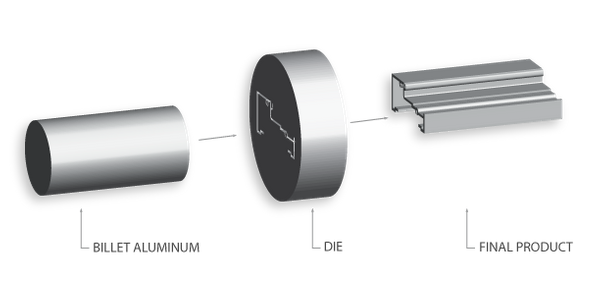Looking back over past blog posts from the Capital StreetScapes web site, we came across the January 28, 2013 entry on the topic of Sand Casting, which is a process used to shape many of the aluminum parts we sell. That post implied that another topic to be covered in the near future would be the process known as Aluminum Extrusion. The problem unfortunately is it never got written – until now.
No matter our age, each of us probably played with Play-Doh somewhere along the way, and many will have experienced squeezing the Play-Doh through their Fun Factory. What was produced was an elongated tube of the miracle substance coming out in various forms, such as a square, star, triangle, etc.
In much the same way, the aluminum extrusion process shapes aluminum by heating an aluminum block (known as a billet) and forcing it with a hydraulic ram through a shaped opening in a die. Extruded material emerges as a long piece with the same profile as the die opening. Once extruded, the hot aluminum profile must be quenched, cooled, straightened and cut. This is how our various decorative sign posts are created.
First identified as an elemental metal in 1807 and first refined in 1825, aluminum was considered a highly luxurious metal and was in fact more expensive than gold. The metal would not become affordable until the end of the 19th century, when Charles Martin Hall and Paul Héroult invented the smelting process and commercial production was developed.
One of the reasons aluminum works so well in creating our extruded decorative sign posts, as well as the various cast aluminum products we offer such as ornamental stop sign frames and cast aluminum bases and finials, is that it’s lightweight, easy to manipulate, inexpensive and abundantly available. It’s also strong, resilient, non-toxic and doesn’t corrode easily. And last but not least, aluminum is recyclable without compromising its properties.
So don’t be embarrassed if this blog has caused you to go digging in your attic in hopes of finding that long-lost Fun Factory Play-Doh extrusion maker. And if you can't find it, I believe they're still available in toy stores.












